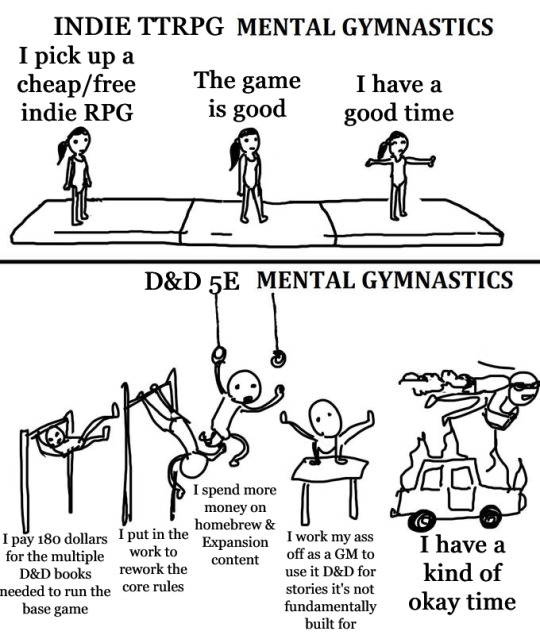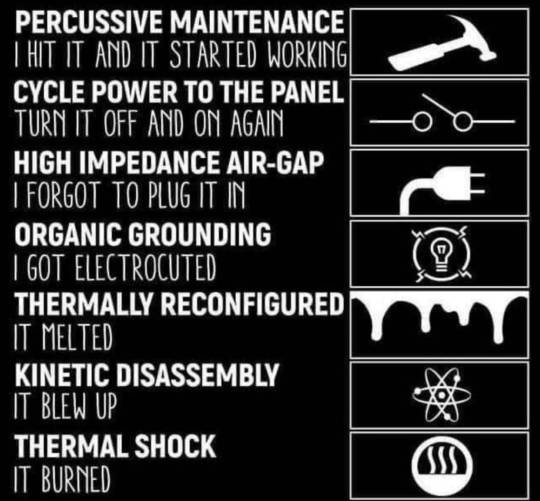Don't wanna be here? Send us removal request.
Text
Everybody needs a little mystery in their tabletop, as a treat.
Everybody go check out Unchained Mysteries by Jesse Burneko.
126 notes
·
View notes
Text

Well, solely for me and some scatterings to the wind, I ended up making a custom trait for @anim-ttrpgs 's Eureka based off Dirk Gently^. And also made a snoop out of him, with their handy-dandy snoop making guide.
Hilariously, did not originally seek to make a trait based off of him, but I was trying to make him playable in Eureka and realized he needed his own little trait to truly capture his specific eccentricities.
^this is more of the Dirk Gently based off the actual books, as I was not aware there was a more recent show, and the provided description of him from said books, which I think I captured fairly well in the snoop style.
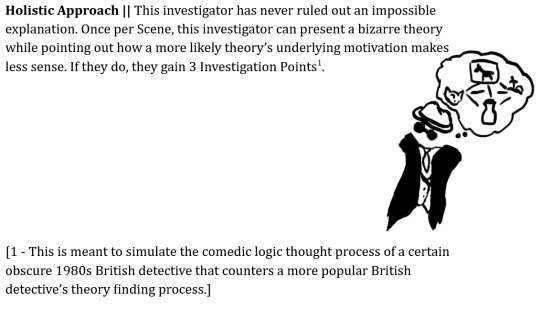
Holistic Approach || This investigator has never ruled out an impossible explanation. Once per Scene, this investigator can present a bizarre theory while pointing out how a more likely theory’s underlying motivation makes less sense. If they do, they gain 3 Investigation Points 1.
[1-This is meant to simulate the comedic logic thought process of a certain obscure 1980s British detective that counters a more popular British detective’s theory finding process.]
Enjoy! I honestly want to hear if anybody uses this trait to create a character. Would love to hear how it went.
48 notes
·
View notes
Text
I just read Unchained Mysteries (link) at the recommendation of @anim-ttrpgs, absolute banger. I love it's metaphor of a good mystery being like Soup. I'm really excited to read Dungeons & Dilemmas next! On a totally unrelated note I'm going to re-write my entire Eureka mystery...
11 notes
·
View notes
Text
Eureka is a system that actually makes me a better player and game designer and I'm still a few weeks out from playing it for the first time. Buck wild how good this system is.
Alongside the wonderful Fear System in Eureka (I refuse to call it sanity as that would be a disservice) I've been looking through it more to better rip it apart and figure out how it works. The reason for this being how deeply connected I feel Horror and Mystery are as genres. Hell they are so close we invented a whole microgenre about it (thrillers) that became its own genre seperate from the other two.
Anyway, actual point, something that Eureka does that I find interesting is Denial of Information. Specifically when it comes to knowledge about other characters. Alongside that it doesnt ask for that just for Vibes. There are textual reasons to keep info hidden from eachother, just as there is irl. Its also doing this is a way that has different motive from other systems I've seen that have similar requests (ie Triangle Agency). Monster characters and others dont want themselves to be revealed for obvious reasons that are relevant because their world is as similar to our own as one can get while still being paranormal fiction.
To me, Eureka showcases how much of living in society is hiding yourself from society and others around yourself. Even the ones you say you trust. And that makes me wonder as a TTRPG designer: what other messages would be bolstered or spoken on by Denial of Information? What are people willing to do to find things out? What happens when you let the unknown and a lack of information come into your games?
120 notes
·
View notes
Text
Whoops I Made a Game!

It's called 5 Questions and is a game about being falsely accused of a crime and interrogated by another player. It's hard to really express the rage that went into its design but hopefully it comes across.
Check it out here for free and toss some money my way if you feel like it.
Peace.
31 notes
·
View notes
Text
reblog with one creative goal that you would like to pursue in 2025 in the tags
it doesn’t have to be ‘big’ and there is no pressure to complete said goal. but i’d love to hear from writers, artists, performers, academics, designers, coders, and so on! 🤍
if it’s a creative outlet, it’s included. let’s inspire each other ⋆ ˚。⋆୨୧˚
20K notes
·
View notes
Text
As the Sun Forever Sets - Terror in the time of the Telegraph
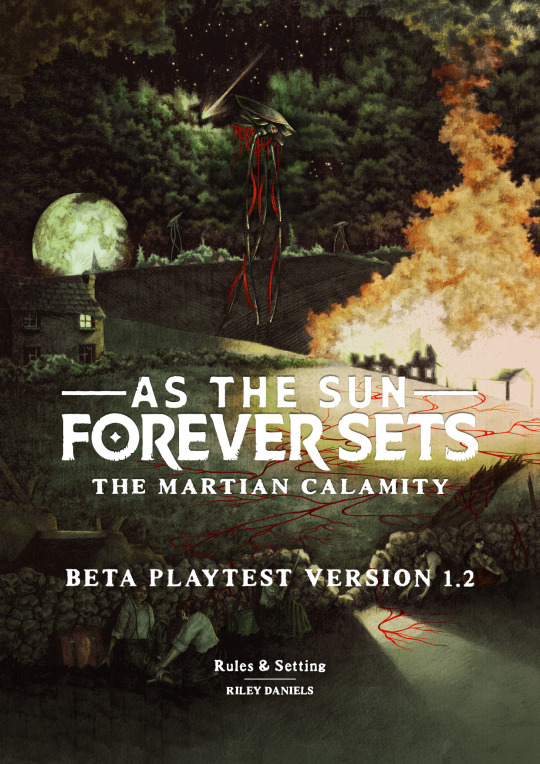
It’s nuts I’ve been working on this game for over 4 years at this point. As the Sun Forever Sets is for sure my biggest and most capital G Game. It even has a publisher and everything. It’s also my first game! Wow! It's been tough, though. We'll get into it!
Britain, 1899
As the Sun Forever Sets is a survival horror sandbox based on the War of the Worlds, utilises the Forged in the Dark ruleset, and is about ordinary people surviving a Martian invasion of Victorian era Britain. We play to find out how they rise to meet the storm of destruction, the ways in which it shapes them, and if they survive to see a new world emerge, or die amidst the rubble of the old.
In the last years of Queen Victoria’s reign, the British Empire stretches across a quarter of the globe, and under the guise of genteel progress and civilisation, it commits theft and murder on a global scale. Britain itself is on the verge of the modern era, the Second Industrial Revolution pushing people into the cities to drive the factories and forges owned by the greedy industrialist class. But beyond the common causes of humanity and unbeknownst to the men who impose their rule over it, vast wheels have begun their inexorable turning. Across 40 million miles of void, the Martian invasion hurtles Earthward. Screaming across the stars, instruments of annihilation unlike anything believed possible lie ready for assembly, alongside the Martians themselves. They are truly inscrutable beings, but their intent is as clear as it is terrible – they will suck the literal and figurative blood from the Earth, and nothing less than the complete and utter subjugation of humanity will be enough.
If this sounds cool to you... well, you gotta wait, it’s not done yet. Sorry! But you can come and hang out in the Sick Sad Games discord, where I post excerpts and occasionally organise playtests.
The Hard Times of (Old) England
Be warned, this is a long one - over 4000 words (if you don't have a Tumblr account, you won't get to the end before it starts bugging you to register one, so go read this on Medium instead.) It turns out when you work on a game for a long time, you have a lot to say about it. Strap in, grab your gin and laudanum, and let’s destroy an evil empire just by existing.
Thanks to the wonderful @hendrik-ten-napel for taking a look over my disorganised thoughts.
(Potential) Spoilers for: The Bear, The War of the Worlds, The Last of Us, Children of Men, Threads, When the Wind Blows, Amnesia: A Machine for Pigs, The Thing.
Roleplay in the Pre-Post-Apocalypse
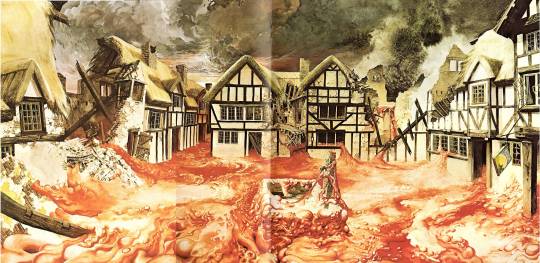
TTRPGs love a good post apocalypse. It's understandable - gas up and ride glorious on the legally distinct fury road, run a commune of like minded weirdos in the ashes of the old world, go digging through retro-futuristic ruins to find retro-futuristic treasures. Who wouldn't want to do any of these? But As the Sun Forever Sets is about an apocalypse as it begins, not after it’s over.
There's a lot of crossover, of course. There’s a focus on similar things - disaster and spectacle, relationships and trust, scavenging and survival. But the bonus of the world not yet being over, is that we get to roleplay out dealing with that terrible, inexorable reality.
youtube
HG Wells wrote a book about blowing up all the places he used to live, and it's a banger. I was surprised to find there wasn't a TTRPG based on the War of the Worlds, being the tantalisingly public domain ur-alien invasion story it is. As the Sun Forever Sets is very explicitly an adaption of it, to the point that before I came up with the name it almost got released as The War of the Worlds: The Roleplaying Game (lol). I'm glad I didn't, doing my own thing has meant both me and the people playing are way more free to fuck around without the expectation that it must adhere to a canon.
The book is good, strikingly modern feeling in parts, and obviously massively influential - so much science fiction can be traced back to our nameless Narrators tormentuous trek across the south of England. But Wells’ prose is typical Victorian - overly wordy and florid (any book that contains the word “ejaculating” meaning “to shout” might be difficult for readers who aren’t used to the style), so when it comes to recommending an actual adaptation, there’s only one true king. Whenever I bring up Jeff Wayne’s The War of the Worlds, the usual reaction from anyone outside of the UK is to say "... they made a what?"
My mom was very keen to get me into musicals, but nothing really stuck until she tried this, the secret best War of the Worlds adaption (sorry Steven Spielberg, but you were doomed from the start.) It's the bombast and drama you'd expect from a disaster film, the horror and pathos of Wells’ classic, all expressed through vivid narration and sick nasty prog rock - wailing guitar and crunchy 70's synths operating at full effect. It's not completely faithful to the book, it doesn't matter. It’s the best.
youtube
Ah yes, the film bro's favourite mid 2000's film. Did you see that sick oner? That’s six minutes without a cut, that means the film’s good right? Children of Men is a slow burn apocalypse, dressed up like a world that’s already ended. Plenty has been written about all the little ways the film is prescient about the state of the UK - the slow belly-crawl into facism and nationalist fervour, the particularly British decay and class divide exacerbated by the desperate times, even the willful ignorance and the explicit sense that everyone’s just given up, it’s all here.
All that thematic stuff seems like it’d be really relevant to As the Sun Forever Sets, right?
Unfortunately, we are in fact here to talk about the long takes. The unbroken moment-to-moment action scenes evoke The War of the Worlds to a tee. Theo navigates danger with the same fraught tactical tension as War of the World's Narrator - dashing between doorways, groping for an axe handle in the darkness, desperately trying to start a car as assailants sprint towards him. What’s the best way out of this situation? How do I get from here to where I need to be? He lives his life in rolling, fleeting 5 second intervals, because he’s forgotten what it means to think in the long term - about the future, and what it might hold.
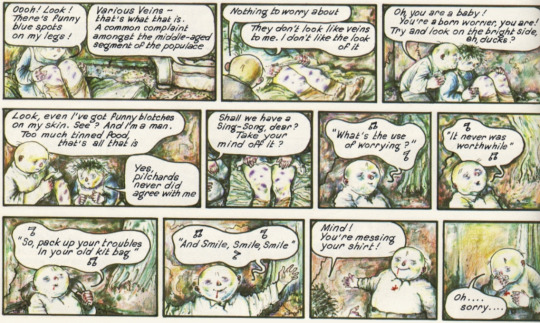
I was always fascinated and terrified by the idea of nuclear war. I guess it comes from watching a lot of 90’s disaster movies, but those are often ultimately fun romps where the day gets saved at the end, or at least the main characters find themselves alive and well at the end of the saga of destruction. Instead, As the Sun Forever Sets asks you to reflect on the horror and sadness present at the end of the world. Things are going to change forever, and change is always hard.
There’s not many clips of Threads and When the Wind Blows online, so it’s a little hard to demonstrate their particular nuclear inflected pitch black darkness. They’re grim - Grave of the Fireflies grim - differing in focus but united in their horrible impact.
When the Wind Blows is a story of an elderly couple living in rural England when the bombs drop, based on the comic by Raymond Briggs. Yes, The Snowman’s Raymond Briggs made a film about 2 lovely grandparents dying of acute radiation poisoning. Jim and Hilda are completely unprepared for what’s to come, their only reference is the Blitz - terrible in its own way, but not a patch on the scale of death they’re about to experience.
They survive the blast and wait for the good old British Government to arrive to save them, as it did in the 40’s. Slowly liquifying in the nuclear fallout, they hold onto each other and keep their spirits up, eventually making the decision to clamber into the paper sacks they mistakenly believed might protect them from the blast. Clutching their medical cards and birth certificates (for the ambulance, sure to be along any minute now), Jim mumbles painfully through a final prayer that morphs into a misremembered Charge of the Light Brigade, and they slip into a perpetual slumber together.
The most tragic part is Jim and Hilda’s unshakeable faith that their government is there for them - ready to catch them when they fall - borne out of Britain’s post WW2 renewal but absent in the 1980’s of the film’s plot, and the Britain of today. It’s a masterful film, shockingly sad, but the shock is the point.

Instead of aiming for your heart, Threads aims for the head. It’s a drama that aims to be as accurate as possible to government research into what a nuclear war might look like, plainly and forensically setting it out without any thought of softening these hard facts for its audience. Rather than focusing on a personal story, Threads flits around several groups of characters - minor government figures and ordinary families. Like Jim and Hilda, they too are woefully unprepared for the end of the world, and those in charge know there’s no way the UK could ever be ready for such a thing.
As mundane life is quietly intruded upon by news updates detailing far off geopolitics and the subsequent escalation that leads to war, the tension rises subtly then suddenly, like a spacecraft on the launchpad. People we’ve seen pottering about their normal lives are maimed and evaporated in the subsequent shocking nuclear exchange, whilst stark statistics flash on the screen - the hundreds of thousands instantly killed, how long the millions more fatally irradiated have left to live, the woefully inadequate tonnage of stockpiled food to feed those who survive. Each zero hits like a gutpunch.
And when you think the film must nearly be over, it keeps going. 1 week later. 1 year later. Threads grinds to an excruciating halt 13 years after the bombs fall, after year upon year of failed harvests from a destroyed earth barely able to support a population level equivalent to medieval Britain. At one point, mute children watch a warped and scratchy VHS of classic kids educational programme Words and Pictures on a TV powered by a steam generator.
The friendly presenter spells out the word “cat” through the thick veil of static, accompanied by a picture of one - an animal the children watching will likely never see. As they watch with blank, emotionless faces, the image of the cat fades to one of its skeletal form. “A cat’s skeleton” the presenter enthusiastically intones. The unrelenting bleakness might feel like a punishment, but Threads doesn’t mean it to be. This is just what would happen, after all.
Love in the time of the Heat-ray
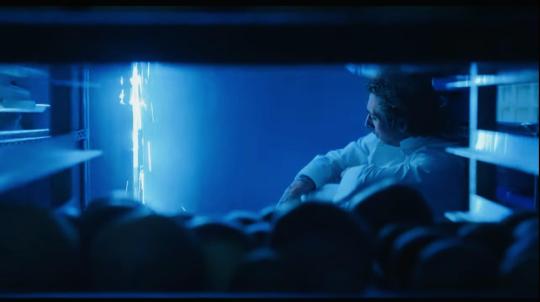
In fact, someone in a Reddit thread said As the Sun Forever Sets “wasn’t just endless misery” and I’m glad that comes across. I wanted there to be moments of tenderness, quiet joy, anger, frustration, love and loss to punctuate the action and the horror.
People are messy and complicated even at the best of times. Under pressure, this is amplified a thousandfold - a little crush becomes a whirlwind romance, small disagreements become full blown fights, and not fully understanding someone might transform them into an enemy in your head.
youtube
The little town Bill conspires to be left alone in ends up comparatively untouched by the horrors going on elsewhere, as untouched as anywhere can be in The Last of Us. He hated the world anyways - so he isolates himself as he prepares for it to end, and it makes sense that his life only really begins as the show does. When Frank arrives, Bill is forced not to just engage with the broader world outside of his little enclave, but in the act of truly living in it.
There’s no prepper’s guide to romance. A human heart can’t be field stripped for maintenance. By choosing to exist as a vulnerable, emotional being, Bill opens himself up to a different kind of apocalypse. Frank becomes the flowering vines that slowly crack the flat concrete wall of a world that Bill created, and when those vines die, the wall can only crumble. It’s so fraught and lovely, delicately yet absolutely gut wrenching. At least their apocalypse was one they decided to have together.
“I’m old. I’m satisfied. And you… were my purpose.” - "Long Long Time”, The Last of Us
youtube
While several of my TTRPG writing friends were gushing about how great The Bear is, Em Acosta, author of the wonderfully inspirational Exile pointed out something super interesting - a lot of the show is about how you deal with people you’ve found yourself stuck with. No matter how much they piss you off, or whatever they do wrong, there’s something that means you can’t ever let them truly exit your life. They’re there, like it or not, until the bitter end.
Turns out this is very similar to how As the Sun Forever Sets handles Player Character relationships. In both it and The Bear, nothing’s ever truly resolved between characters - every relationship is like a cooking pot perpetually simmering. You might’ve apologised, made a truce, or just ignored your issues for so long that they seem to disappear, but no matter what, you’ve got to keep your eye on that pot.
Because suddenly a crisis will hit, and someone says something, or a diceroll comes up bad and all of a sudden the pot boils over and things are once again fucked. You storm out, start screaming, throw a fork. Even in the worst case scenario where a Character leaves because they’re absolutely sick of the rest of the group, they might show up at the end of the game for one last scene. Who knows how you’ll all feel at the end - nothing is ever truly fixed, and only the dead are truly broken.
“I quit, chef, is what’s going on. You are an excellent chef. You are also a piece of shit. This isn’t on me. Goodbye." - “The Review”, The Bear
youtube
I’ve talked about The Thing a little before, John Carpenters sweaty, paranoid antarctic masterpiece. Along with the incredible effects and the (mostly) restrained use of action and bombast, the thing that makes... The Thing work is that the staff of the stricken research base lack any and all emotional intelligence.
It’s sort of the ultimate reverse Dudes Rock movie. Nobody knows anything about each other, so when their bodies and minds are colonised by the titular chameleon from outer space, they’re just another stranger to the rest of the crew. I’d ask you a question only you would know the answer to, but uh.. I don’t know anything about you. Whoops!
Over the course of the film, the whole operation falls apart as they try their best to work together to deal with the alien interloper, but their complete lack of ability to trust or relate to each other - present even before the crisis they find themselves in - is their ultimate downfall.
That final excellent shot of MacReady and Childs sat in the snow at the end of the film as their compound burns around them is the subject of a lot of unnecessary theorycrafting youtube videos, which kind of misses the point. Each suspects the other, but ultimately it doesn’t matter if one of them’s a Thing. One stranger is the same as another. Why bother getting to know each other now?
“Well...What do we do?” “Why don't we just... wait here for a little while? See what happens.” - Childs and Macready, The Thing
Science Fiction Revenge Fantasy
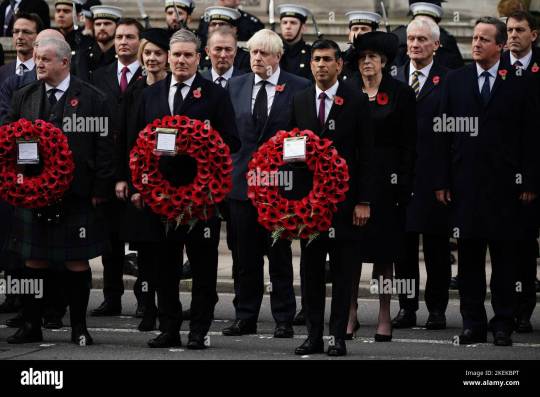
I’m not a historian, but the parallels between 1899 and now are pretty plain to see. Increasing class disparity, a lack of political will to help those in need, rampant cronyism and profiteering. As long as you’re in the place for it, roleplaying in a fictionalised version of the past to air out the issues of the present can be super fun and cathartic. You’re not expected to get a degree in British history to make it work, either.
The title is a play on the phrase “The Sun Never Set on the British Empire”, and it’s plainly stated in the book that Britains Empire acted as a mechanism of genocidal oppression, and that the Martians are here to end it - intentionally or not. It’s appealing as a premise on the face of it, but it goes a little deeper. Memories of Empire echo across time in Britain like the ringing of a malevolent bell, a cause celebre for braying Tories and fascistic right wing cunts (two very close circles in the venn diagram.)
We used to be a great country before this woke nonsense. Things were better back in the old days. The DEI contingent is trying to destroy our noble past. Yada yada yada, fuck offff. I’m sure someone somewhere will accuse me of “wokewashing” the past for including explicitly trans and queer characters as part of the book, along with the historical facts around how we fit into the oppressive Victorian conception of sex and gender. Unfortunately for them, we’ve always been here.
To be a little pretentious about it, every game of As the Sun Forever Sets reaches back into the past and cuts the myth of a glorious and benevolent Empire, and the good old days enjoyed within it off at the neck, purely in the act of beginning one. That sparks a little joy for me. Destroying a racists dream is fun, even if it’s only in the abstract.
youtube
A horror game about the most literalist Victorian industrialist imaginable hearing the phrase “Eat the rich” and getting right on that. I’ve not played Amnesia: A Machine for Pigs despite fond (??) memories of playing The Dark Descent in a room full of jumpy friends, and seeing Dear Esther played live on stage, with a live orchestra and narrator - an exquisite way to experience that game.
The mechanical chops of Frictional Games mixed with the narrative verve of The Chinese Room, how could this game be anything less than incredible?
After The Dark Descent I fell off’ve the “scary guy chases you around” genre of game until Alien: Isolation revitalised it, and the reviews of A Machine for Pigs were mixed - kind of boring, middling gameplay, too dark - so I never went back. I was planning on writing a little about its vibe - dark, gothic Victoriana that rhymes nicely with As the Sun Forever Sets - but after a bit of research, Mandus’ quest for his missing sons strikes an unexpectedly resonant and terrible chord.
The writing and voice acting is phenomenal, Mandus’ split consciousness - the self you play and the other half of him that’s seen the horrors of the forthcoming 20th Century and is compelled to act, imbued into the myopic machine he built - is extremely compelling. He feels compassion for the poor and wants to save them, but they fill him with fear and disgust. He knows the industrialist class is killing the world, but feels a deep shame in the fact that he counts himself amongst them. So his machine grinds the rich into meat for the poor, who it distorts into grotesque pig homunculi and forces them to operate the machine’s inscrutable workings.
It’s Mandus’ twisted way of saving the world - kill the rich for their crimes, enslave the poor for their own good, all hail the new machine/god/manager of the 20th century. It’s a neat reflection of the way modern politicians contort themselves to the whims of big business and AI snake oil salesmen to avoid doing the simple and obvious things that’d better the world. It’s a nightmarish refutation of Victorian Liberalism, that only the upper class know how to fix the problems of the lower class. It’s brilliant, and we should play it.
"Do you hear me Mandus? This is what you planned! This world is a machine! A Machine for Pigs! Fit only for the slaughtering of pigs! Whores, beggars, orphans, filthy degenerates. Pigs all. But I will purify the streets, cleanse this city, set the great industry free. I will clean the world, make it pure." - The Machine, A Machine for Pigs
Song of the Year, of the Century
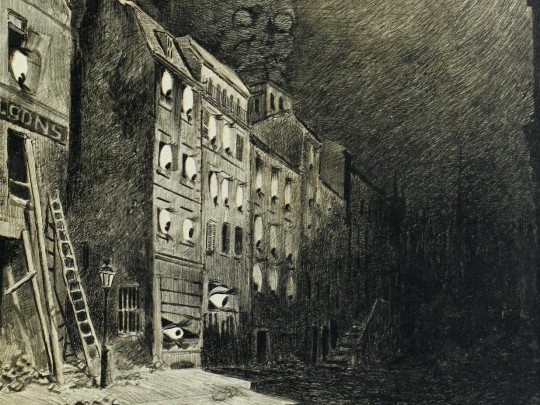
Not long after I came out as trans, I was asked what (in an ideal world) would make transition easier. I replied - never having to leave the house. One day I'd shut the front door as a man and another day, months or years later, I'd open it again as a woman, neatly sidestepping the terror of being perceived in a notoriously transphobic Britain.
In 2020 I shut that door and didn't open it for 4 months. At work, I remember calling the nearby shelter to donate our excess hand sanitizer and toilet roll, figuring out at the last second how support workers could take calls from their already isolated clients via their mobile phones, and fixating on the steady stream of scared coworkers leaving early. Tearfully, I felt the urge to hug those that remained as we locked up, before we remembered we probably shouldn't.
I've never been more aware of the minutia of moving through a space on the way home - How many people had their hands on this handrail? Have I touched my mouth or eyes without realising? Is anyone in the office already sick? Or on this train? How many more people are going to die? - My heart was in my chest, I heard the blood whoosh through my head to the beat of my steps on the pavement. At home, I realised my boyfriend had to go into work the next day. After he went to sleep, terrified he might die, I cried.
"I remember I felt an extraordinary persuasion that I was being played with, that presently, when I was upon the very verge of safety, this mysterious death—as swift as the passage of light—would leap after me from the pit about the cylinder, and strike me down." - "The Heat Ray", The War of the Worlds
Writing As the Sun Forever Sets was my way of coping with the disconnect with the world I felt, the fear of both Covid and the rising transphobia kept me inside even as the lockdowns eased. That feeling of throbbing death creeping at the window took a long time to wrestle under control, and getting deeply obsessed with a big project became part of that process. It seems incredibly maudlin to make a TTRPG dealing with darkness and death during a pandemic that killed (and continues to kill) millions of people, but I suppose I’m kind of a maudlin person.
youtube
“I haven't written a song in a month, So I'm playing the same chords again. I know I need to get lost in the moment, But I get lost before it begins. Fingers stretching out into space. Reaching as a thought slips away.”
It also burnt me the fuck out. After years of constant work and testing (beginning long before Evil Hat picked up the game), I ran out of steam. I spent the months after Evil Hat’s public playtest ended not really able to write anything ATSFS related at all. The game kind of froze - I knew what I wanted to change or fix or add, but the moment the google doc opened I couldn’t make myself start typing. It was incredibly frustrating to have the switch flip from endless obsessive writing to constant nothing, and I don’t think I truly recognised the burnout I was feeling until recently. It turns out spending years staying up past midnight writing is bad, who know!
youtube
A lot of Forged in the Dark games don’t get finished (or more accurately, get stuck in perpetual development), something that the excellent and dearly missed +1 Forward podcast recognised in their episode collecting their thoughts on the FITD games they looked at back in 2021. I think that’s because, at least to me, writing a Forged in the Dark game is like trying to hold a plate of spaghetti without the plate. It’s deceptively simple at its heart, but the system squirms when you poke at it - write one thing and it affects 3 other things. Tug one piece of pasta out and you lose a meatball without realising it.
When I listened to that episode, I took it as a challenge. Part of me now wonders if it was a curse. I'm being hyperbolic, of course. But a little part of me did think it might be better to give the game up.
That’s not going to be As the Sun Forever Sets' fate, thankfully. Evil Hat has been there to support me when I’ve felt guilty about shifting another deadline or replying to a check-in email with another late “Not much progress this month, sorry!” The frozen writers block is thawing, and I’m so tantalisingly close to finishing the final text. This blog is part of that process, another chip in the icy dam.
The wheels of dread Martian terror turn once again, and it feels good. Part of that is down to not beating myself up about a lack of progress. The more important part came when I realised I felt able to return to the world again - living in it, not hiding from it. Staying connected to it, even when there's times I'm not able to inhabit it physically. Covid, Britains particular brand of transphobic brainworms, and the shadow of Empire all continue to exist, and so do I - a weird maudlin transsexual woman - in spite of them all.
“The day seemed, by contrast with my recent confinement, dazzlingly bright, the sky a glowing blue. A gentle breeze kept the red weed that covered every scrap of unoccupied ground gently swaying. And oh! the sweetness of the air!” - “The Stillness”, The War of the Worlds
You made it!
Thanks for sticking with my messy thoughts. If what I talked about here sounds cool to you, please stop by the Discord, we'd love to have you. Look forward to seeing As the Sun Forever Sets come to a crowdfunding platform of Evil Hat's choice (I assume backerkit) at some point in the future ♥.
111 notes
·
View notes
Text
a solid 40% of game design is recognizing when you're making things too hard on yourself
5K notes
·
View notes
Note
Can you say more on The Burning Wheel? The information on the site doesn’t distinguish it much from other TTRPGs that I can tell, aside from being a D6 system. What makes it unique and worth playing? (You don’t have to provide a huge rundown haha I’m just curious!)
Sure! I tried to keep this short and failed miserably, but I’d be happy to expound even more upon specific things later, if people want more :)
(Please note that, as with any ttrpg, it would be hard to claim any of the things mentioned here are wholly original to The Burning Wheel. It would be even harder to claim that no other systems have used these mechanics or philosophies in the 20 years since The Burning Wheel came out. I am not going to claim either of those things - its the combination of them and the play experience they have resulted in for me that make it unique, so that’s the angle from which I’m writing this post.)
So. why is it worth playing? How is it different?
I could talk about the skill learning system, the war rules codex, the whole concept of versus tests vs bloody versus tests. But to me, there are two main ways that it stands out from other systems: its treatment of role-play as a mechanism, and the overall philosophy behind the game’s design, including the concept of setting clear expectations.
(using section headers to break up the text lol)
How it uses role-play:
The most obvious thing to point out is that there’s a whole set of encounter mechanics for social situations or debates (Circles checks, Duel of Wits, etc.) - sort of the epitome of crunchy role play. But thats not what I’m getting at! What I’m getting is the fact that good role play is integral to the way the game functions.
Let’s go back, all the way to character creation: When you’re burning a character, you selecting life paths (page to squire to knight, etc.) with their associated skills and traits, then tie them in a pretty bow with beliefs and instincts to guide the character’s actions. All of these things feed into each other to make a complete character. Easy! Familiar! We all know how to make a character, even if the numbers and labels are different!
What really matters to this engine once you’re playing is whether the character you’re acting as matches what you built. If it doesn’t, the rules nudge you to redefine your character until it does through systems of rewards, penalties, and consequences. You are rewarded for sticking to and acting on your traits, beliefs, and instincts through different types of points distributed and voted on by fellow players, which can be used to alter the course of events or turn the tide of a bad situation later on. If you’re not living up to a trait, on the other hand, you can lose it and all its benefits. (Took the fortitude trait, but ran from trouble one too many times? tough luck! the other players voted to take away that trait and now you can’t call on it in moments of peril.) The beliefs and traits of a single character can end up at odds with each other, resulting in characters having to make choices that in other systems might seem insignificant or carry few lasting consequences, but here may alter the function of your character.
It’s not all punitive measures, btw! One of my characters caused problems for everyone else by refusing to put away a weapon when someone else was in danger, playing off of an instinct that states he draws his weapon whenever his master does. After the session, another player suggested everyone consider nominating the Brave trait for him the next time we update them. As a character-type trait, it has no effect when rolling dice but does mean that henceforth and forevermore, anyone who interacts with him will notice a sense of bravery. Delightful!!
Also, the beliefs of different characters are practically guaranteed to stray from one another at some point, which is the primary source of inter-PC conflict. Because the mechanics of the game encourage and reward sticking to your beliefs or following your stated instincts even when it makes things significantly harder or causes problems, you’re much more inclined to do it. As someone who is terrible at not slipping back into the same kind of character over and over again, I think this fucking rules.
I’m playing with a group of people I’ve been gaming with for almost five years, and this has opened the way for much richer dynamics between our characters than any of the other systems we’ve played, in part because as players we’re less interested in acting on concensus to drive the plot forward. Working as one unit simply isn’t the goal, and if it was, we would play a different system that encourages and rewards that.
the game’s philosophy, aka setting intentions and also reading rules:
Now we’re starting to get at the philosophy behind the game’s design: It believes you have to know why you’re playing burning wheel instead of literally any other game. This isn’t a system you play on accident. It’s admittedly a complicated game with a LOT of rules. It asks for a huge amount of engagement from all of the players, not just the GM - something like inter-PC conflict can only work well if everyone is on the same page (figuratively, but also literally lol) and ready to help adjudicate rules, ask for tests, discuss intentions, etc. Dream scenario for a chronic rules lawyer lol.
Obviously any game will be more fun if everyone has actually learned the rules before they start playing, but this is one where it’s extremely difficult (if not impossible) to play if most players haven’t learned them, and deeply rewarding if they have. It really operates on the expectation that everyone is putting in work, and everyone has respect for the time and effort the others are bringing to the table.
It’s hard to put a finger on how this all impacts play other than the obvious elegence of People Knowing What Theyre Doing, but on a purely emotional and meta level, knowing that everyone is investing so much time and effort to play a game with you is just.. idk, it feels special and makes the time itself feel even more valuable. In that sense, the satisfaction of playing the game isn’t coming from the game itself, but is still shaped by it.
(In my mind, this is the #1 reason to try the game, but as @thydungeongal alluded to yesterday, finding people willing and able to do it is also the #1 hurdle to, like, actually having a good time. it would be completely miserable otherwise.)
Also, for a game that does not boast a collaborative nature the way some others do, it is honestly pretty fuckin collaborative lol. I don’t know that this was Luke Crane’s intention in designing the game, but closing out sessions by going through and grading everyone’s work and giving each other glorified gold stars, you will inevitably end up discussing and dissecting things, learning from people’s character work, and seeing where and how you can improve individually and as a group. It creates a table culture that values honest expressions of discomfort or dissatisfaction, and also of appreciation and celebration. It’s after-care. It leads naturally into setting intentions and expectations for the next session. It just feels really nice!!!
That’s obviously a table culture that can be cultivated anyway, and it’s a practice my group has learned to be very intentional about facilitating, but it’s just interesting how The Burning Wheel of all systems manages to support that. I think that’s what the website means when it says playing this changes how you play other rpgs lol
So yeah, idk how much more to say and also I’m sooooooo so eepy and was like an hour late for work, so its a weird brain day. but there you go lol
152 notes
·
View notes
Text

I drew you as a warriors cat, you have a knife and goofy eyes, suffer
don’t test me i’ll draw anyone as a warrior cat
4K notes
·
View notes
Text
what are yalls favorite ttrpgs with very artistic layouts?
35 notes
·
View notes
Text
31K notes
·
View notes
Text
You Should Check Out My Majora's Mask TTRPG
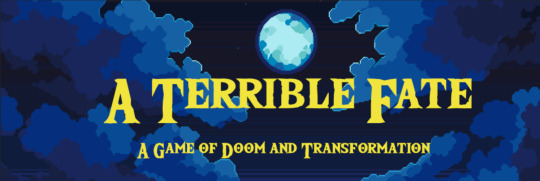
Hey, I made a Forged-in-the-Dark game called A Terrible Fate, and I think it's pretty cool.
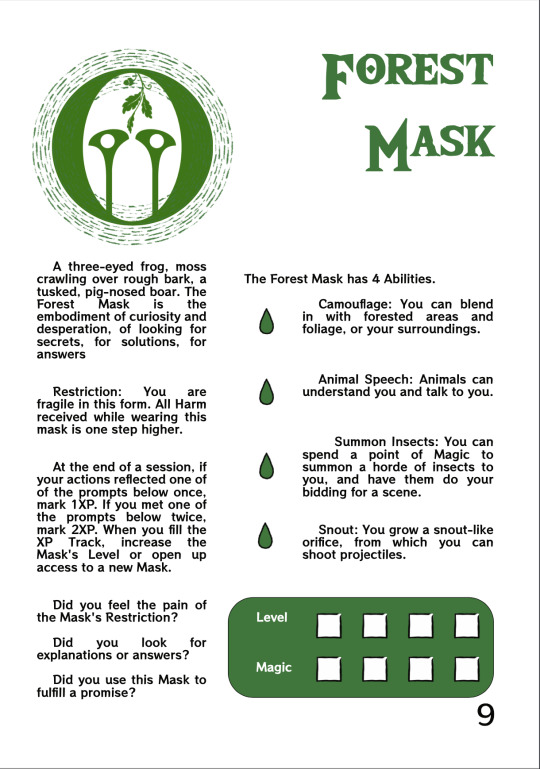
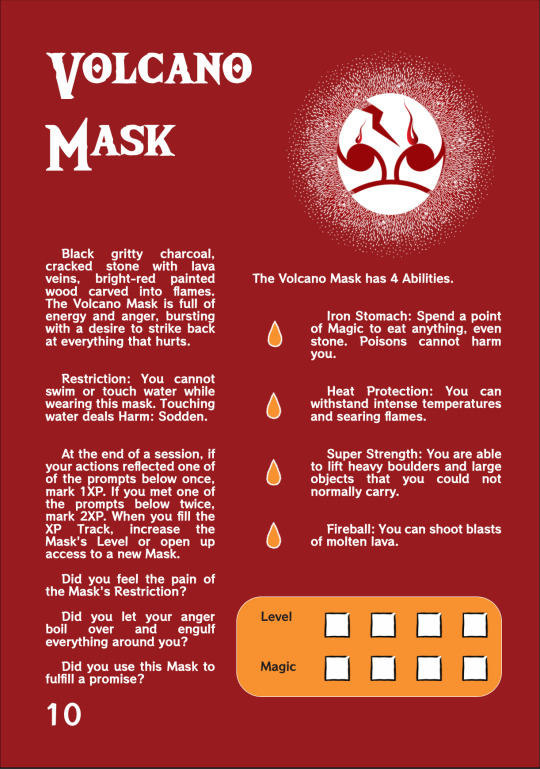
The game uses a Mask mechanic that allows your characters to transform into different entities for every dungeon they travel through, granting them unique powers and weaknesses that allow them to fight some kind of burgeoning corruption in order to free the Spirits within.
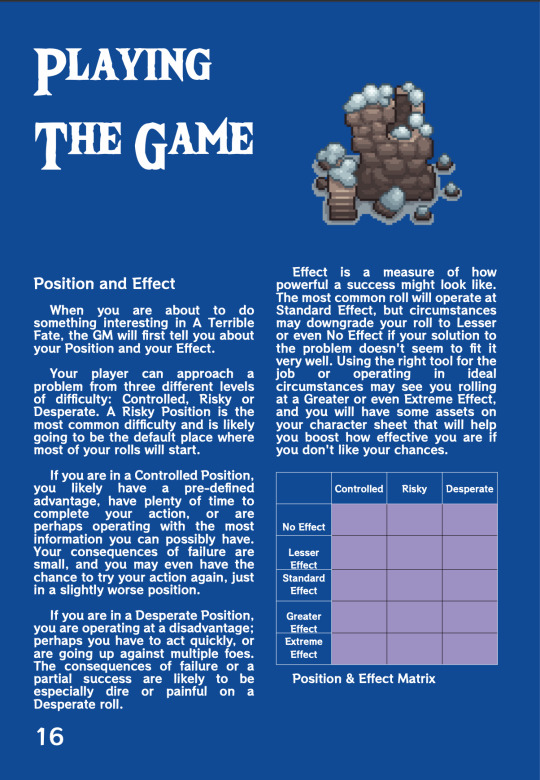
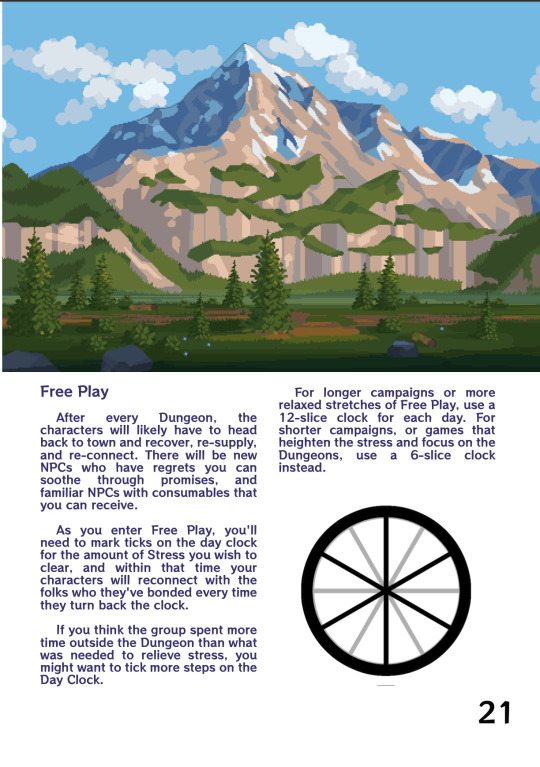
The game also has themes of doom, grief and invisibility; it asks you to save a world that will never remember you, because you have to turn the clock back every three days. I think the whole concept is really neat.
You can download the game for free on Itch.io, and you can also get the links to online play-kits that hold information about your characters, your world, the NPCs whose lives you try to change, and the Masks that you'll pick up as you adventure.
212 notes
·
View notes
Text
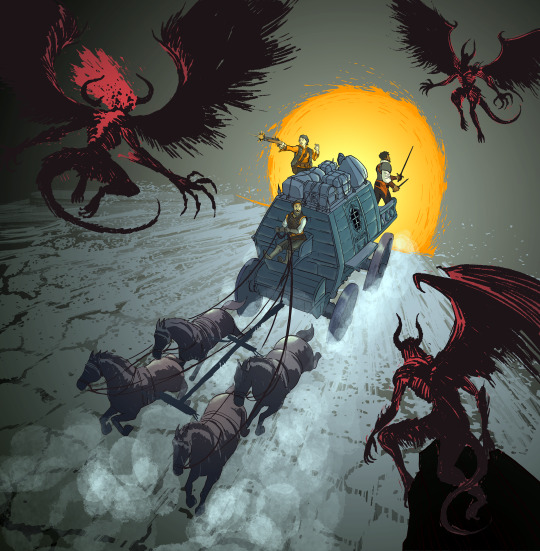
Been awhile since I've posted one for the archives, this is for an as-yet unreleased game about renaissance couriers who use Dante's hell as a shortcut in their work.
127 notes
·
View notes
Text
Love yourself like tabletop RPG designers love Capitalized Words.
881 notes
·
View notes
